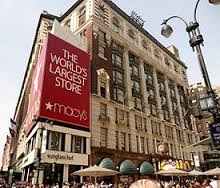
Canadian retailer Hudson’s Bay Co., of which Baker Program in Real Estate benefactor Richard Baker (SHA ’88) is Governor and Executive Chairman, is in preliminary discussions regarding a potential takeover of leading U.S. department store chain Macy’s Inc. (NYSE: M), The Wall Street Journal reported on Friday, citing “people familiar with the matter.” Many commentators and analysts in the rapidly-downsizing and consolidating retail sector immediately speculated what this could mean for the future of Macy’s. A takeover by Hudson’s Bay, which also owns U.S. retailers Lord & Taylor and Saks Fifth Avenue, would be a spectacular end to what has been an increasing struggle for one of the most historic American retailers. Shares of Macy’s rose as much as 12 percent on Friday, its biggest intraday gain since Aug. 11, according to Bloomberg.
 To be clear, Richard Baker should not be considered a retailer who is 100% focused on selling clothing and other merchandise. Baker, in addition to being a retailer, is a shrewd real estate operator seeking control of the big buildings in prime locations that sell clothes and shoes. He is likely not seeking to buttress the Hudson’s Bay brand by adding the iconic New York City department store that is forever etched in the American consciousness by “Miracle on 34th Street.”
To be clear, Richard Baker should not be considered a retailer who is 100% focused on selling clothing and other merchandise. Baker, in addition to being a retailer, is a shrewd real estate operator seeking control of the big buildings in prime locations that sell clothes and shoes. He is likely not seeking to buttress the Hudson’s Bay brand by adding the iconic New York City department store that is forever etched in the American consciousness by “Miracle on 34th Street.”
Taking over the 158-year-old Macy’s would be an achievement for Hudson’s Bay. Currently, its market capitalization stands at C$1.8 billion ($1.4 billion), which is a fraction of Macy’s $9.9 billion market capitalization. Macy’s also has $7.5 billion in debt on its balance sheet, according to the WSJ report. To pull it off, Hudson’s Bay could raise equity and debt against its real estate portfolio, something which Richard Baker has had success with over the past few years. Furthermore, the Journal noted that Hudson’s Bay could also bring in a capital partner, also a strategy it has had recent success with.
As mentioned, to get an idea of how the logistics of how a Macy’s takeover may take place, one can look no further than the recent history of Hudson’s Bay. Baker and his company have proved especially adept at buying companies and properties using complicated financial structures with very little cash.
In 2013, Hudson’s Bay bought Saks Inc. for $2.4 billion, financing the deal with mostly new equity and debt. The next year, Baker took out a mortgage against the flagship Saks property on 5th Avenue, valuing the location at $3.7 billion, more than $1 billion more than he had paid for the entire company. In addition, Baker took some of Saks’s stores, among other properties, and formed a real-estate joint venture with mall operator Simon Property Group. The group borrowed millions of dollars, which Hudson’s Bay used to pay down some of the debt it took on to buy Saks.
Later that year, Hudson’s Bay used a similar strategy to buy German retailer Galeria Kaufhof for C$3.2 billion. The deal was financed by the sale of 40 of 59 Kaufhof properties into the existing joint venture with Simon. This resulted in there not being any need to issue additional shares or take on more debt.
Therefore, a Hudson’s Bay takeover of Macy’s could lead to further store closures, which Macy’s is already doing, emerging as a more-efficient business on a much smaller scale. Some commentators have already suggested that the remainder of the stores could be divested in a decades-long asset sale, similar to Eddie Lampert’s strategy with Sears, which could end with the bankruptcy of one of America’s most storied companies.
As mentioned, the preliminary discussions are set against a backdrop of continuing woes of Macy’s, the biggest American department store chain. The storied retailer has struggled to remain relevant as e-commerce and discount retailers continue to decimate the traditional brick-and-mortar business. Last month, Macy’s announced plans to cut more than 10,000 jobs and close stores.
In addition to the assault from e-commerce, shoppers have been trained to hunt for bargains in the years since the recession. Discount stores and outlet malls have flourished, while traditional stores have been forced to respond by trimming their prices, which cuts into margins. The result has taken the form of a virtual race to the bottom, with shoppers becoming accustomed to discounts and forgoing paying full price.
Although no official announcements have been made by either party, one thing is clear: Macy’s is in play. A sale to Hudson’s Bay or any other party could signify the end of the department store chain as we know it. Expect the retail and real estate world to keep a close eye on this story.
